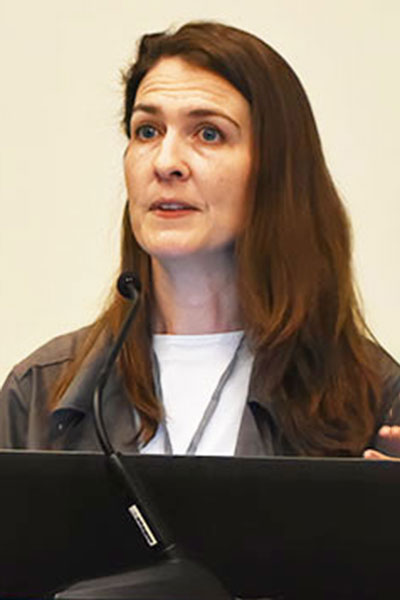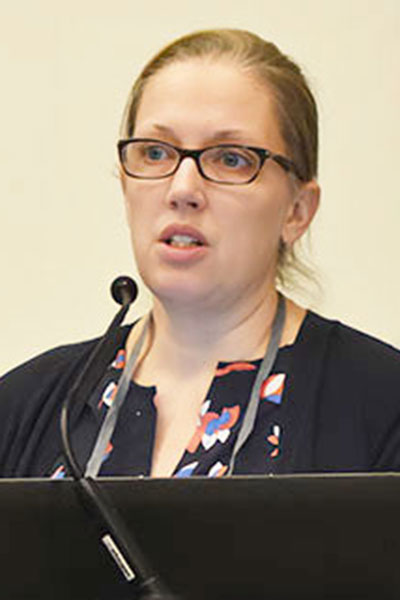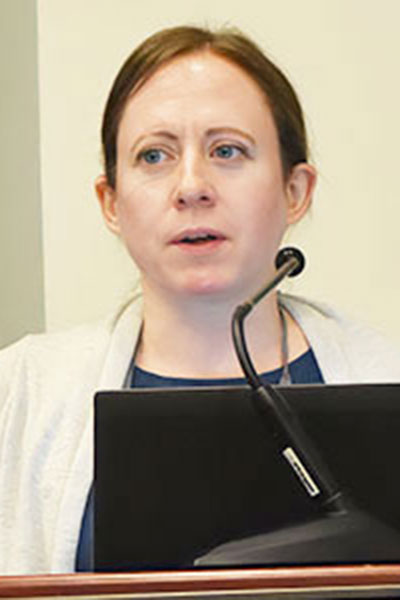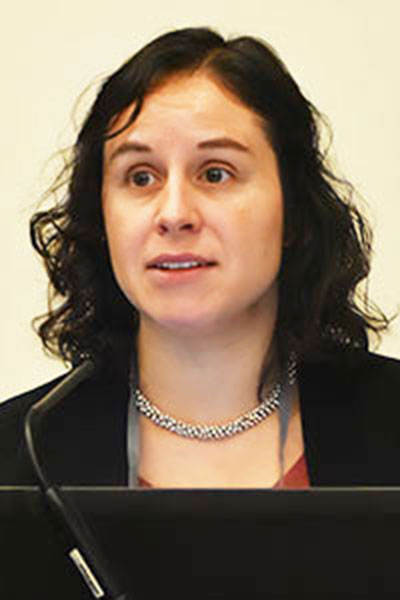Fatigue in the workplace is a chronic concern—especially among shift workers—and one with major implications for health, safety, and productivity. The short-term strategies for addressing sleep issues are well known, but the long-term strategies continue to evolve.
At Sleep and Workplace: How Can We Do Better? on Sunday morning, four experts in the area of sleep study and fatigue mitigation discussed guiding principles for sleep and their effect on shift workers and medical trainees, circadian alignment for business travelers, and testing and management of sleepy patients.

Erin Flynn-Evans, PhD, MPH, director of the NASA Ames Research Center Fatigue Countermeasures Laboratory, started off the session with a discussion on guiding principles for shift workers. Dr. Flynn-Evans noted that recent research into the short- and long-term effects of sleep loss and circadian desynchrony is helping experts understand the relationship between shift work and mental health issues.
“Recently, there have been a lot of good studies linking sleep loss and circadian misalignment with burnout, even within the short-term time frame,” she said. “And while we may be able to do a little bit to manage the short term, the long-term consequences are more challenging.”
Dr. Flynn-Evans explained that studies show an increased risk of metabolic disorders, vascular events, and cancer among shift workers, but longitudinal data on long-term health are lacking, and mitigation strategies tend to focus on well-known, short-term solutions. Some longer-term solutions could include beneficial timing of meals, lighting interventions, and additional scheduling techniques.

Melissa Knauert, MD, PhD, assistant professor of pulmonary medicine at Yale School of Medicine, applied fatigue mitigation tactics specifically to the multidimensional issues of sleep deficiency among medical trainees and attending health care providers.
“Providing medical care to patients is physically and mentally demanding, and it’s expected that programs adopt fatigue mitigation processes and ensure there are no negative consequences or stigma for using these strategies,” Dr. Knauert said. “This requirement emphasizes the importance of adequate rest before and after clinical responsibility.”
The need for good sleep habits is a given, but medical trainees experience high-intensity, around-the-clock workloads. Sleep disorders are also common among attending physicians, indicating sleep issues may be lifelong for many clinicians.
“I try as much as possible to emphasize that while we’re teaching medical trainees to be medical doctors, we should probably also train them on good sleep habits because those are skills they will need for the entirety of their career,” she said.

Sabra Abbott, MD, PhD, associate professor of neurology in the sleep medicine division at the Feinberg School of Medicine at Northwestern University, researches the two-process model of homeostatic and circadian sleep regulation involved in jet lag.
“If we put individuals in a time-free environment, we still have consolidated bouts of rest and wake. But for most individuals, that gets a little bit later every single day. This is our endogenous circadian clock,” Dr. Abbott said. “The most important component of this … is the fact that the clock can be reset.”
Resetting depends both on the stimuli someone receives and the internal circadian time at which they receive that stimuli. Dr. Abbott has studied light response, as well as melatonin phase response, and how those factors can help travelers adjust to new rhythms or return to previous ones.
She also studied hypnotics, which have shown some benefit for eastward travelers and less for westward travelers, but added the caveat that the combination of these substances and air travel has resulted in poor outcomes for some passengers.

Concluding the session, Lauren Tobias, MD, assistant professor of medicine, section of pulmonary, critical care, and sleep medicine at Yale School of Medicine, shared some practical considerations for managing patients for whom sleepiness may be impacting their ability to function—and function safely—while they’re at work.
“We have an abundance of data showing that insufficient sleep and sleepiness on the job has financial implications for employers, including reductions in workplace productivity, absenteeism, and suboptimal work performance,” Dr. Tobias said.
Dr. Tobias discussed sleep testing and effective treatments for when a sleep disorder is diagnosed. That could include positive airway pressure and pharmacotherapy, but also more frequent opportunities to sleep. People in many professions, like commercial driving, underreport sleepiness, she said, due to the threat of loss of income.
“Given these limitations and the resources that go into this kind of testing, the test is probably most useful in patients where the inability to stay alert constitutes a safety hazard for them on the job,” she said.
Join us at CHEST 2025
Save the date for the next Annual Meeting, October 19 to 22, 2025, in Chicago. CHEST 2025 will explore the latest advancements in pulmonary, critical care, and sleep medicine, with a focus on innovation and the future, just as the city itself embodies progress and reinvention.





